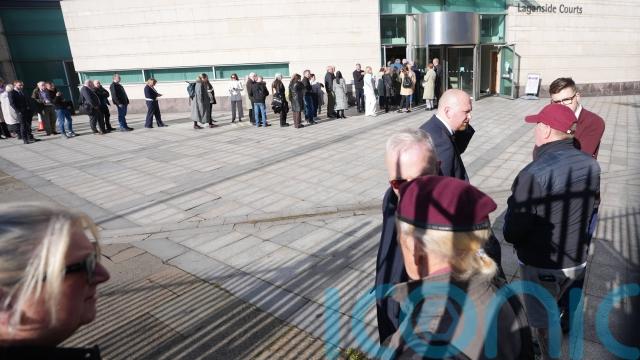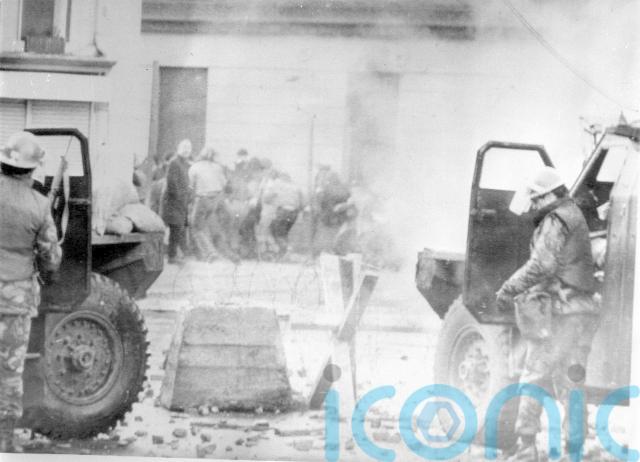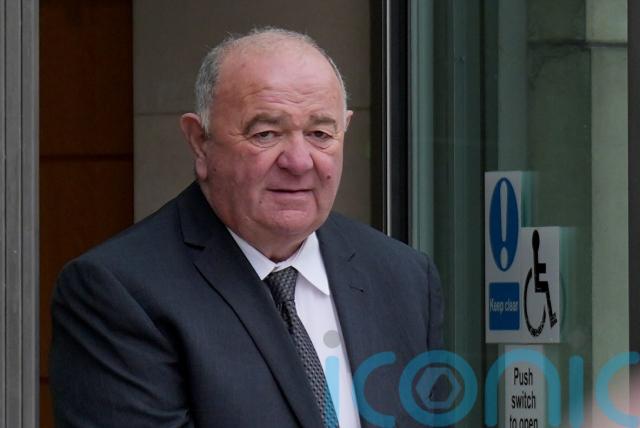
The long-awaited trial of Soldier F survived to run its course despite two applications that could have seen it stopped.
A momentous day was hailed on September 15 as the Belfast Crown Court trial opened in courtroom 12, the larger of those available in the Laganside complex.
The former paratrooper’s anonymity was preserved with a curtain as he faced two murder charges and five attempted murder charges over 50 years after the events of Bloody Sunday during which 13 civilians were shot and died in Londonderry.
Relatives of those killed travelled from Derry every day of the non-jury trial before Judge Patrick Lynch, sharing the public gallery with some who attended to support Soldier F.

Prosecution barrister Louis Mably KC described the events of Bloody Sunday as having had a “long-lasting and profound effect” on Northern Ireland.
But the trial took a specific focus on the shootings in Glenfada Park North where it was contended that Soldier F killed William McKinney and James Wray.
The court heard a statement from late ex-Stormont MP Ivan Cooper, who felt he had to “live with the responsibility” of having led people on to the streets on that fateful day.
Mr Mably moved on to what he termed “decisive evidence” on the second sitting day – statements made by two of Soldier F’s colleagues, referred to as Soldier G and Soldier H.

They included statements made by both to the Royal Military Police (RMP) on the night of the shootings, as well as statements to the Widgery Inquiry later in 1972 and a transcript of oral evidence they gave to that inquiry, and evidence given by Soldier H to the Saville Inquiry in the 2000s.
The prosecution argued they placed Soldier F in Glenfada Park North and having opened fire.
Mr Mably described the contents of the statements as “both truthful and untruthful”, with some of the contents consistent with other eyewitness evidence and according with known facts.
Neither were available to give evidence to the trial, with Soldier G having died, while Soldier H indicated that, if compelled to attend, they will exercise their privilege against self-incrimination.
Soldier F also did not give evidence and had previously indicated to police he had no reliable memory of the events of the day.

On day three of the trial, defence barrister Mark Mulholland argued the hearsay statements were not admissible, and described them as a “series of unreliable, fundamentally flawed, inconsistent allegations”.
However, Judge Lynch ruled on September 24 that the evidence could be admitted at that stage.
The trial went on to hear from a number of witnesses, including some of those shot and injured on Bloody Sunday.
They included Joe Mahon who was 16 years old at the time and was struck by a bullet at Glenfada Park North and went on to “play dead” until aid arrived.
Michael Quinn, who was 17, was shot in the face while Malachy Coyle, who was 15, recalled seeing people lying on the ground, some dead, amid shots being fired.
Last week, Mr Mulholland submitted a no-case-to-answer application, arguing the evidence “didn’t stack up” with the statements by Soldier G and Soldier H contradicting each other, as well as with civilian evidence.
However Judge Lynch dismissed the application, allowing the trial to continue.
Proceedings drew to a close on October 16, with Judge Lynch rising to consider delivering his verdict a week later.
In his judgement on Thursday, Judge Lynch described delay as having “seriously hampered” the capacity of the defence to test the statements from Soldier G and Soldier H, and found they have been serially untruthful as well as having committed perjury, concluding that the evidence fell “well short” of the criminal standard.
Subscribe or register today to discover more from DonegalLive.ie
Buy the e-paper of the Donegal Democrat, Donegal People's Press, Donegal Post and Inish Times here for instant access to Donegal's premier news titles.
Keep up with the latest news from Donegal with our daily newsletter featuring the most important stories of the day delivered to your inbox every evening at 5pm.